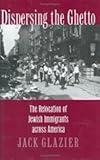Dispersing the Ghetto : The Relocation of Jewish Immigrants across America / Jack Glazier.
Material type: TextPublisher: Ithaca, NY : Cornell University Press, [2018]Copyright date: ©1999Description: 1 online resource (256 p.) : 11 tablesContent type:
TextPublisher: Ithaca, NY : Cornell University Press, [2018]Copyright date: ©1999Description: 1 online resource (256 p.) : 11 tablesContent type: - 9781501724961
- 973/.04924 21
- E184.353 .G53 1998
- online - DeGruyter
| Item type | Current library | Call number | URL | Status | Notes | Barcode | |
|---|---|---|---|---|---|---|---|
 eBook
eBook
|
Biblioteca "Angelicum" Pont. Univ. S.Tommaso d'Aquino Nuvola online | online - DeGruyter (Browse shelf(Opens below)) | Online access | Not for loan (Accesso limitato) | Accesso per gli utenti autorizzati / Access for authorized users | (dgr)9781501724961 |
Frontmatter -- Contents -- Acknowledgments -- Introduction -- 1. Jewish Immigrant Distribution -- 2. Confronting Immigration Restriction -- 3. Internal Debates -- 4. The IRO at the Local Level -- 5. Conclusion -- Notes -- Index
restricted access online access with authorization star
http://purl.org/coar/access_right/c_16ec
In the early twentieth century, the population of New York City's Lower East Side swelled with the arrival of vast numbers of eastern European Jewish immigrants. The teeming settlement, whose inhabitants faced poverty and frequent unemployment, provoked the attention of immigration restrictionists. Established American Jews—arrivals from the German states only a generation before—feared that their security might be threatened by the newcomers. They established the Industrial Removal Office (IRO) to assist in relocating the immigrants to the towns and cities of the nation's interior. Dispersing the Ghetto is the first book to describe in detail this important but little-known chapter in American immigration history.Founded in 1901, the IRO for nearly two decades directed the resettlement of Jewish immigrants in New York and other port cities to hundreds of communities nationwide, where the prospects of employment and rapid assimilation were brighter. Drawing on a variety of sources, including the IRO archive, local records, first-person accounts of resettlement, and the lively Jewish press, Jack Glazier recounts the operations of the IRO and the experiences of those it aided. He closely examines the complex relationship between the two sets of Jewish immigrants, emphasizing the mix of motives underlying the assistance the American Jews of German origin rendered the newcomers from eastern Europe.
Mode of access: Internet via World Wide Web.
In English.
Description based on online resource; title from PDF title page (publisher's Web site, viewed 26. Apr 2024)


